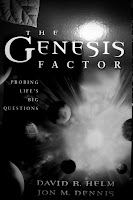The Genesis Factor by David Helm and Jon Dennis attempts to provide a framework by which Genesis and indeed the whole bible can be understood as it is to bible-believing Christians. The authors do this by taking us slowly through the first three chapters of Genesis and unveiling the truths that may not be noticeable to first-time readers.
This is a fundamental rule of reading: A book must be understood on its own terms before it can be evaluated.
I don't really know what I was expecting from this book as it was a bit of an impulse buy but at the end of the day I'm glad it's in my library. This is a book primarily for people who asking the big questions in life (who am I? where did I come from? is there a god? if he really did create the universe then why does he want to know me?) and what to know what kind of answers the bible has to give.
David and Jon do a good job of breaking down the context and literary style of Genesis so what is left is original meaning. This is not a scientific book, as Genesis is not a scientific book. What it does get to is the truth in the text and how Genesis is the start of a complete and consistent message displayed through the whole bible, the focus of which is Jesus.
What I like about this book is that it isn't heavy handed. The authors aren't trying to shove anything down readers throats. While they make it clear what they believe, they also relate to other opposing thinkers and theories and encourage readers not to accept every word they say but discover for themselves whether the bible is relevant by reading the entire thing themselves. They are not trying to convert people, but they are trying to start a conversation and they are providing answers in an easy to read way.
All in all the book flows well, and is an excellent starting place as it contains the full text of the first three chapters of Genesis. It has definitely opened my eyes as well and enabled me to understand Genesis better. It just goes to show, you're never done learning.
Four stars.









